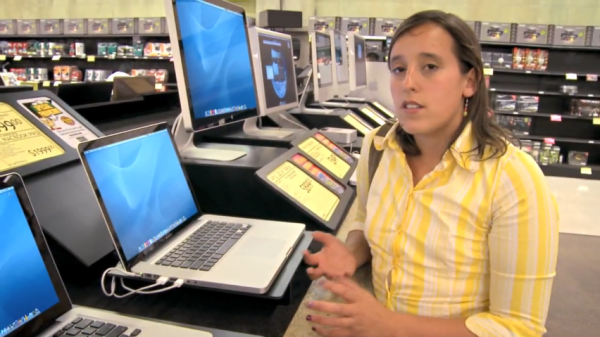
Web-based solution for Palm Pre iTunes dilemma
Since Apple terminated iTunes' compatibility with the Palm Pre this week, there have been a number of services that have rushed to the forefront to make sure users aren't left with an unsyncable Pre for too long. This morning, Web-based syncing service Dazzboard announced its support for the Pre.
"We feel it is very unfair of Apple to penalize Palm and its growing Pre community, and we hope our free application will provide a solution for users are now left in cold due to Apple's decision," said Dazzboard CEO Tera Salonen.

Google reports Q2 profit, says market 'appears to have stabilized'
Admitting after that the fact that "a quarter ago we had no idea where the bottom was," Google said on Thursday that the bottom was apparently a quarter ago. The company reported its lowest ever growth rate for revenues in its recently ended second quarter, expanding just 3% year-over-year.
The company reported revenues of $5.52 billion for the second quarter. Operating income (GAAP) was $1.87 billion, up about $290 million year over year, but representing a larger percentage (34% vs 29%) of revenues compared to the previous year. Net income (again, GAAP) was $1.48 billion compared to $1.25 billion in Q2'08. And EPS was... insert drum roll here... $4.66, compared to $3.92 last year, and about 25 cents/share above analysts' predictions.

No 'Bing boom' yet: ComScore data confirms Bing's slow growth
Earlier this month, the first sampling data from Web researcher StatCounter suggested that Microsoft's new Bing search service was gathering momentum, albeit slowly. Today, the first broader-based data analysis from ratings service comScore closely confirms what the early samples were saying: During the month of June, Microsoft-hosted searches including Bing for US customers numbered just 30 million more than for Microsoft-hosted searches including Windows Live the month before. This is during a month when just over 14 billion general searches were processed by the nation's top five providers.
The news looks a little better for Microsoft when you consider that June was a slow month for searches overall -- down by 2% among the nation's top 5 providers, and flat overall when advanced searches and the sites that facilitate them, are entered into the picture. So while Google's general search traffic declined by 2% in keeping with the general trend, its US usage share overall stayed flat at 65%. Bing gained 0.4% of usage share over Windows Live last June -- better than flat, but not the "Bing Boom" that some made it out to be.

Palm releases SDK for webOS
Today, Palm finally made its Mojo SDK available to the public more than a month after the release of the Pre, and more than five months of the Early Access Program, a sort of beta program for devs.
Now, Palm's app store is open to submissions from all developers, and apps submitted after today's SDK launch will start to appear in the app catalog this fall. In the meantime, submissions from the Early Access Program are "already in the pipeline" for release, according to Palm.

The Pirate Bay goes the way of Grokster
Imagine a peer to peer model where you got paid to seed a torrent, and had to pay every time you leeched. That's what the Pirate Bay could become, and it appears it could be a case of history repeating.
In an article published first in The Music Void, Wayne Rosso, former president of notorious P2P service Grokster and founder of Mashboxx says he has begun working with Global Gaming Factory X, the Swedish firm that recently bought the Pirate Bay, to turn the service legit and legal without changing the user experience at all.

Mozilla rushes Firefox 3.5.1 to address serious vulnerability
Download Mozilla Firefox 3.5.1 for Windows from Fileforum now.
After yesterday's discovery of a serious security hole left open by Mozilla Firefox's new TraceMonkey JavaScript engine, the organization chose not to wait until next week -- as had been its plan on Tuesday -- to open up availability of its version 3.5.1 bug fix. Instead, the completed build showed up on Mozilla's FTP servers late Thursday morning, although access to that build through HTTP had been sporadic throughout the early afternoon.

Microsoft should use Twitter data theft as hosted apps marketing FUD
Microsoft couldn't pay for counter marketing as good this. Twitter has officially admitted to a security breach, via personal e-mail account, and the pilfering of confidential documents stored in Google Apps. Can you say, "On-premise computing?"
Based on the cycle of renewals, an unusually large number of Microsoft volume-licensing subscribers must re-up by July 31 or not at all. Given the econolypse's impact on IT spending and, because of layoffs, number of seats to renew, those license renewals may come harder than ever. Then there are all those newfangled hosted applications, some from Microsoft, and Google's push into the enterprise with Google Apps Sync for Microsoft Outlook.

IDC: Apple drops behind Toshiba in PC market share
Apple has dropped to fifth place in the US market according to preliminary second quarter estimates from market analysis firm IDC. The manufacturer had reached the fourth place position in 2008, but has failed to keep up that momentum in 2009, retaining a steady market share while its two nearest competitors, Acer and Toshiba, race ahead.
In the first quarter, for example, the company's shipments shrank by 1.2% year over year; and in the second quarter, shipments were down by 12.4%, according to IDC's Quarterly PC Tracker report. This negative growth would not have affected Apple all that much, as it has retained a steady 7.6% market share throughout the year, but Acer jumped up 2.1% in market share during the quarter, and Toshiba went up by 1.1%.

In the Palm of iTunes' Hand: Why won't Apple play nice?
I tune, you tune, we all tune to iTunes.
Except if you own a Palm Pre.

Can Linux manage updates and upgrades more easily than Windows?
Our continuing Linux-vs.-Windows series turns now to the absolute basics -- the most universal, and occasionally most important, task you will undertake with any computer. Whatever software and OS you use, whatever you do with the machine, sooner or later you're going to install, update or upgrade something. How does the process compare on the two platforms?
(Again, Mac OS folk, you're not the topic of discussion here. If you want to comment on the .dmg experience or other aspects of tending your Apple orchards, please do so in comments, civilly.)

Analyst: Apple game console by 2013
Speaking with Industrygamers about the state of the Video Game business, Wedbush Morgan analyst Michael Pachter said it's "natural" that Apple could convince a large number of iPod and iPhone gamers to buy a game-enabled AppleTV, similar to the way it has drawn users to the Mac platform through the iPod.
Pachter, however, doesn't think it will be a full-blown gaming machine like Microsoft's Xbox 360 or Sony's PlayStation 3, but that it will instead be more Wii-like." We'd get cool stuff like World of Goo or Geometry Wars," Pachter said, "but probably not super cool stuff like Gears of War until they bought a few developers."

What's Now: Amazon sued, Nokia not skidding so much, and Dell plunges
Nokia earnings sequentially up, at least
Morning of Thursday, July 16, 2009 • One of the most wince-inducing earnings calls for reporters in recent months has been Nokia's, but things seem to be a tiny bit brighter at the Finnish phone firm as sales rose 7% in Q2 from the previous three months. They're still down 25% year-over-year, of course, but company officials Thursday said they believe the market for mobile devices to be "bottoming out." (The company still chose to revise its earlier target of raising its market share; now the company says it aims to maintain that share at 2008 levels.) Earnings per share were likewise down year-to-year (65.5%) but up sequentially (233.3%).

Microsoft laughs off Apple legal request to kill TV ads
Apple is a company known for good design -- meaning also that appearances matter beyond just the products. Apple's legal department may have done something that appears simply laughable. Even if untrue, it's a helluva good story -- and a Microsoft executive tells it. Well.
Apple has a reputation for issuing legal take-down notices. The practice is a byproduct of the company's penchant for secrecy. Many Websites posting leaked Apple product pics have felt the burning ire of Apple lawyers. Today, at Microsoft's annual partner conference, COO Kevin Turner described receiving what could be characterized as the ultimate take-down notice.

Top 5 non-obvious feature enhancements to Office 2010
The question has been asked, who really needs to use Microsoft Office these days? The answer is, anyone who is in the business of professionally generating content for a paying customer. Word 2010 may not be the optimum tool for the everyday blogger, and Excel 2010 maybe not the best summer trip planner, just as a John Deere is not the optimum vehicle for a trip to the grocery store. But in recent years, Microsoft is the only software producer that has come close to understanding what professional content creators require in their daily toolset.
So far, the improvements we've found from actually using the Office 2010 Technical Preview released Monday (as opposed to the ones Microsoft told us about) can mainly be described as usability enhancements -- tools that appear to be responses to how people actually use the products. Compared to Office 2007, which threw out the old instruction manual with regard to how applications should work, Office 2010's changes are subtler, slicker, and less ostentatious. Of those we've noticed in our initial tests, here are five which we feel will make compelling arguments for at least some users to upgrade:

Security and the e-textbooks proposal
I have a test of nerves for you. I want you to go grab $200 in twenties and some plastic wrap. (Look in the kitchen for the plastic wrap; you're on your own for the cash.) Wrap the cash in the plastic. Now find a kid, preferably one of about elementary-school age. An assortment of kids of various ages is better, if you have multiple instances of plastic-wrapped bills, though the ease of finding extra cash around the house is of course inversely related to the number of kids present.
Each child should come naturally equipped with a backpack, which they use to haul stuff to school, playdates, and the homes of other family members as well as for random covert storage purposes. Now, I want you to reach into each backpack (don't be scared!) and place a plastic-wrapped bundle of money in there. Tell the child that the money is her responsibility from now on; it must be present and accounted for at all times; they will spend much of every day looking at it but will not be allowed to use it as they please; damaged money or plastic will get the child into trouble.



